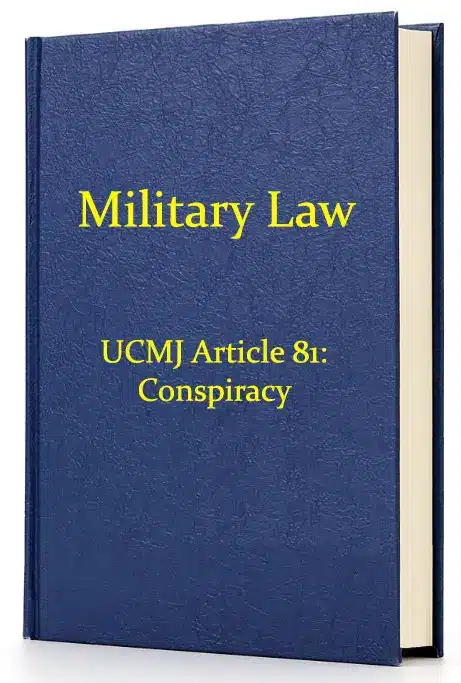Article 81 (Conspiracy) of the MCM states a service member may be subject to prosecution if they:
-
conspire with any other person to commit an offense, or
-
if one or more of the conspirators commits an act to affect the object of the conspiracy.
Article 81 also contains provisions specifically for offenses committed under the law of war that result in the death of at least one individual. These provisions include:
-
the accused agreed with one or more persons to commit an offense under the law of war;
-
that, while the agreement continued to exist, and while the accused remained a party to the agreement, the accused knowingly performed an overt act to bring about the object of the conspiracy; and
-
death resulted in one or more victims.
Understanding Article 81 (Conspiracy) of the UCMJ
Individuals may be prosecuted for conspiracy even if they are physically incapable of committing the offense. The offenders involved in a conspiracy do not need to have written documentation of their agreement, nor does the deal need to be spoken of formally. A conspiracy may be charged for something as simple as the parties involved come to a mutual understanding that lacks specific details but is acted upon.
The conspiracy’s objective must be a violation of the UCMJ, and the act itself must be an incident separate from the agreement. The offense may or may not be criminal, but it must be a result of the agreement between the parties involved. The intended offense does not have to be committed for the parties involved to be prosecuted for conspiracy. Suppose one conspirator acts upon the agreement without the knowledge of the other conspirators. In that case, the other conspirators are subject to the same consequences, with or without their understanding of the act being committed.
Maximum Possible Punishments for Violations of Article 81
Persons found guilty of a violation of Article 81 are subject to the maximum possible punishment authorized for the offense that is the subject of the conspiracy. The punishment is for the intended offense, whether or not it is committed. However, if the accused is found in violation of Article 81 under the law of war and if their transgression resulted in the death of one or more victims, the accused may be subject to the death penalty.
How do you defend against Article 81 Conspiracy charges?
When facing the combined resources of the military and the current cultural climate, you need to be prepared to defend your career and your freedom. Crisp and Associates, LLC has a team of experienced trial attorneys who have won these cases. This team includes the firm’s founder, Jonathan Crisp, a highly respected former Army JAG with over 23 years of experience in military law and a sought-after speaker and lecturer on military law. Donald Gordon has litigated cases before the Discharge Review Board, the Board for Correction of Military Records, and the Board for Correction of Naval Records regarding various matters and a diverse background of clients.
If you or someone you know is facing Article 81 charges for Conspiracy, you must speak with a Military defense attorney immediately.




